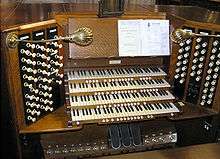Definify.com
Webster 1913 Edition
Organ
Or′gan
Or′gan
,Webster 1828 Edition
Organ
OR'GAN
,Definition 2026
Organ
Organ
German
Noun
Organ n (genitive Organs or Organes, plural Organe)
- (anatomy) an organ
- Die Haut ist unser größtes Organ.
- The skin is our largest organ.
- Die Haut ist unser größtes Organ.
- an organ, a publication (newspaper, etc) of an organization
- Das Witzblatt ist das Organ der Spaßpartei.
- The Joke Sheet is the organ of the Fun Party.
- Das Witzblatt ist das Organ der Spaßpartei.
- an organ, a body or organization with a particular purpose or duty
- an organ, a part of a government, such as an office or ministry
Derived terms
- (publication): Parteiorgan, Zentralorgan
Declension
References
organ
organ
English

Noun
organ (plural organs)
- A largest part of an organism, composed of tissues that perform similar functions.
- (by extension) A body of an organization dedicated to the performing of certain functions.
- (music) A musical instrument that has multiple pipes which play when a key is pressed (the pipe organ), or an electronic instrument designed to replicate such.
- 1918, W. B. Maxwell, chapter 5, in The Mirror and the Lamp:
- He was thinking; but the glory of the song, the swell from the great organ, the clustered lights, […], the height and vastness of this noble fane, its antiquity and its strength—all these things seemed to have their part as causes of the thrilling emotion that accompanied his thoughts.
-
- An official magazine, newsletter, or similar publication of an organization.
- A species of cactus (Stenocereus thurberi).
- (slang) The ****.
Hyponyms
- See also Wikisaurus:organ
Derived terms
Related terms
Translations
|
|
|
|
|
External links
- organ in Webster’s Revised Unabridged Dictionary, G. & C. Merriam, 1913
- organ in The Century Dictionary, The Century Co., New York, 1911
Verb
organ (third-person singular simple present organs, present participle organing, simple past and past participle organed)
- (obsolete, transitive) To supply with an organ or organs; to fit with organs.
- Bishop Mannyngham
- Thou art elemented and organed for other apprehensions.
- Bishop Mannyngham
Anagrams
Norwegian Bokmål
Etymology
From Ancient Greek ὄργανον (órganon), via Latin organum
Noun
organ n (definite singular organet, indefinite plural organ or organer, definite plural organa or organene)
See also
- orgel (musical instrument)
References
- “organ” in The Bokmål Dictionary.
Norwegian Nynorsk
Etymology
From Ancient Greek ὄργανον (órganon), via Latin organum
Noun
organ n (definite singular organet, indefinite plural organ, definite plural organa)
See also
- orgel (musical instrument)
References
- “organ” in The Nynorsk Dictionary.
Polish
Pronunciation
- IPA(key): /ˈɔr.ɡan/
Noun
organ m inan
- organ, part of an organism
- (by extension) unit of government dedicated to a specific function
- (politics) organ, official publication of a political organization
Declension
Romanian
Etymology
From Byzantine Greek ὄργανος (órganos), from Ancient Greek ὄργανον (órganon), partly through the intermediate of Slavic oruganu. Some senses also based on French orgue (cf. orgă), Italian organum, Italian organo.
Noun
organ n (plural organe)
Declension
Synonyms
- (musical instrument): orgă
See also
Serbo-Croatian
Pronunciation
- IPA(key): /ǒrɡaːn/
- Hyphenation: or‧gan
Noun
òrgān m (Cyrillic spelling о̀рга̄н)
- organ (part of an organism)
Declension
Swedish
Pronunciation
Noun
organ n
- (anatomy) an organ (a part of the body)
- (dated) a voice (of a singer or actor)
- Hon förenade med ett utmärkt teateryttre en hög grad af intelligens, en ypperlig organ och en förträfflig deklamationskonst
- She combined with excellent theatrical looks a high degree of intelligence, an extraordinary voice and a splendid mastery of declamation
- Hon förenade med ett utmärkt teateryttre en hög grad af intelligens, en ypperlig organ och en förträfflig deklamationskonst
- an organ; a newspaper (of an organization, i.e. its voice)
Declension
| Inflection of organ | ||||
|---|---|---|---|---|
| Singular | Plural | |||
| Indefinite | Definite | Indefinite | Definite | |
| Nominative | organ | organet | organ | organen |
| Genitive | organs | organets | organs | organens |
Related terms
|
|